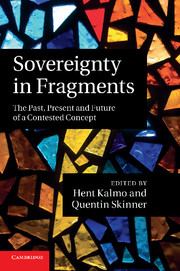Book contents
- Frontmatter
- Contents
- Notes on contributors
- Acknowledgements
- Introduction: a concept in fragments
- 1 The sovereign state: a genealogy
- 2 The apparition of sovereignty
- 3 The Westphalian myth and the idea of external sovereignty
- 4 Double binds: sovereignty and the just war tradition
- 5 The durability of organized hypocrisy
- 6 A matter of fact? The many faces of sovereignty
- 7 The survival of sovereignty
- 8 Sovereignty and after
- 9 Prolegomena to the post-sovereign Rechtsstaat
- 10 Sovereignty beyond the state
- 11 Sovereignty between government, exception and governance
- 12 Conclusion: vocabularies of sovereignty – powers of a paradox
- Bibliography
- Index
3 - The Westphalian myth and the idea of external sovereignty
Published online by Cambridge University Press: 04 February 2011
- Frontmatter
- Contents
- Notes on contributors
- Acknowledgements
- Introduction: a concept in fragments
- 1 The sovereign state: a genealogy
- 2 The apparition of sovereignty
- 3 The Westphalian myth and the idea of external sovereignty
- 4 Double binds: sovereignty and the just war tradition
- 5 The durability of organized hypocrisy
- 6 A matter of fact? The many faces of sovereignty
- 7 The survival of sovereignty
- 8 Sovereignty and after
- 9 Prolegomena to the post-sovereign Rechtsstaat
- 10 Sovereignty beyond the state
- 11 Sovereignty between government, exception and governance
- 12 Conclusion: vocabularies of sovereignty – powers of a paradox
- Bibliography
- Index
Summary
The idea that the diplomats who gathered in Münster and Osnabrück to put an end to the Thirty Years' War ended up establishing a new international order has for a long time enjoyed the status of textbook knowledge, both in the disciplines of international relations and international law. This idea is now increasingly discredited. Critics have attacked its central claim – that the peace treaties of Westphalia replaced the universalistic, hierarchical order of states with a system composed of independent ‘sovereign’ states – on at least two different levels. First, there is the level of textual criticism. Scholars, who have actually taken pains to read the rather technical texts of the treaties, have pointed out that they had nothing to do with the sovereignty or independence of European actors, nor did they refer to any corollary of sovereignty, such as non-intervention. This kind of criticism, of course, can be evaded – and indeed, has been evaded by the proponents of ‘Westphalian sovereignty’ – by arguing that the principle of sovereign equality was implicitly rather than explicitly acknowledged or legitimized in the treaties and served henceforth as the foundation for the European order. Yet even this more cautious interpretation of the Westphalian thesis can hardly withstand the second level of criticism, which is based on the historical analysis of the post-Westphalian settlement.
- Type
- Chapter
- Information
- Sovereignty in FragmentsThe Past, Present and Future of a Contested Concept, pp. 64 - 80Publisher: Cambridge University PressPrint publication year: 2010
- 7
- Cited by

